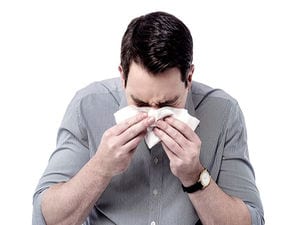
TUESDAY, Nov. 28, 2017 (HealthDay News) — Seasonal allergies make life miserable for millions of Americans.
So, in a bid to ease some of that discomfort, experts from two leading groups of allergists created a task force that has just issued new practice guidelines on the best ways to quell those bothersome symptoms.
The consensus? For most people, nasal steroid sprays are the way to go, according to the American Academy of Allergy, Asthma and Immunology (AAAAI) and the American College of Allergy, Asthma and Immunology (ACAAI).
The sprays are easy to get — many are available over-the-counter. And, they’re relatively inexpensive. For the OTC versions, a month of treatment is about $15 to $20. OTC brand names include Nasacort, Nasonex, Flonase and Rhinocort, while prescription brands include Beconase, Qnasl and Veramyst, according to the AAAAI.
But the biggest reason the experts are recommending nasal sprays is that they’re generally more effective than other types of allergy medicine for the initial treatment of seasonal allergies, according to the new guidelines.
Plus, they have relatively few side effects, according to Dr. Punita Ponda, associate chief of allergy and immunology at Northwell Health in Great Neck, N.Y.
Nasal sprays aren’t perfect, however. “They can cause itching of the nose, dryness of the nose and nosebleeds,” Ponda said. But, she added, using the proper spray technique can help lessen these side effects. She suggested asking your doctor to show you how to use these devices.
Seasonal allergies are often called hay fever and they span the seasons. The Nemours Foundation reports that people can be allergic to one or more types of pollen or mold, and the type dictates when symptoms strike.
For example, in the Middle Atlantic states, tree pollen is the culprit from February through May, followed by grass pollens from May through June, and weed pollens from August through October. Mold spores, meanwhile, typically peak from midsummer through the fall, depending on where you live, according to the foundation.
The new guidelines recommend nasal steroid sprays as the initial treatment for people aged 12 and older instead of an oral antihistamine such as Benadryl, Zyrtec, Claritin and Allegra. The task force didn’t find evidence of an improvement in results if oral antihistamines were added to treatment, and these drugs may cause sleepiness.
In people 15 and over, the task force recommends starting treatment with a nasal steroid spray instead of a leukotriene receptor antagonist (such as Singulair or Accolate). Again, the nasal spray appears to be more effective. Singulair and Accolate are prescription drugs, so cost depends on your insurance plan.
For people with moderate to severe seasonal allergies who are older than 12, the task force suggests adding an intranasal antihistamine to treatment with a nasal steroid inhaler. The additional medication provided additional benefit for those with more severe allergies, the task force said.
Ponda noted that the task force didn’t recommend intranasal steroids for kids under 12.
“It may be easier to give oral antihistamines than intranasal steroids to children, and there’s concern about possible growth suppression. Oral antihistamines were thought to be useful for this group,” she said.
Dr. Luz Fonacier, who directs the allergy training program at NYU Winthrop Hospital in Mineola, N.Y., also pointed out that the medications in “this guideline for initial treatment of mild seasonal [allergies] may be obtained OTC, and therefore may have been tried by the patient.”
She said that for people who aren’t helped by nasal steroids, oral antihistamines, nasal antihistamines and leukotriene receptor antagonists may lessen symptoms.
Ponda said if nasal steroids and additional drugs don’t control allergy symptoms well, or if someone just gets tired of having to use medications regularly, allergy shots are also an option.
“Allergy shots have been shown to be cost-effective compared to medications. Usually, you get one shot a week for six months, and then once a month for three to five years. It’s definitely a commitment, but it’s the only treatment that’s actually disease-modifying. Allergy shots actually make a person less allergic or non-allergic,” Ponda explained.
The new guidelines were published online Nov. 27 in the Annals of Internal Medicine.
More information
Learn more about seasonal allergies from the American Academy of Allergy, Asthma and Immunology.
